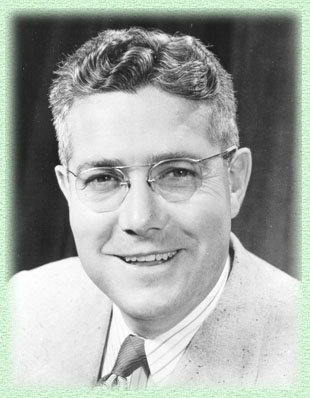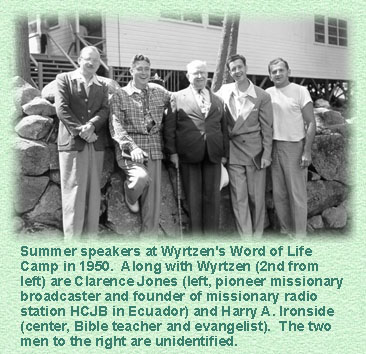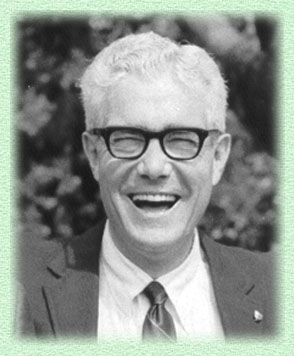


INTERVIEWER: Besides the radio work, of course, you were one of the first people to go on television and preach. Is...is that correct?
WYRTZEN: Yeah.
INTERVIEWER: How did that come about?
WYRTZEN: How did you remember all these things? [laughs] You did your homework.
INTERVIEWER: I think...actually I...I had thought that Percy Crawford was the first person to go on the air in November of '49, an Evangelical or evangelist. But I discovered that you were on in April of '49.
WYRTZEN: Yeah. In fact, I think it was in early '48, actually. I met a fellow who was the...running Channel 13 in New York City. And everything was in...it was black and white. It was all being experimented with.
INTERVIEWER: Do you recall his name?
WYRTZEN: No. I might think that I...I don't recall now. He was the manager. And so he invited us to come in to a Sunday night program. And a friend of mine who was an artist, he became the director of it [laughs]. I mean, everything was very much in the experimental stage. And we set up a living room scene. And we'd have young people sit around on the floor, and the quartet would sing, and I'd preach and so on. Then....

INTERVIEWER: Why do you think he invited you, just to see how people would react?
WYRTZEN: Yeah. That was it. Ten o'clock Sunday night, and it was like it was coming from our home. A lot of people thought it was. Then he invited us to...oh, then we were going to...(that's why I know it was '48), we were going to Yankee Stadium, and he tried to work it out so that it could broadcast live television...live from Yankee Stadium. But I think it got to be cost...so costly that we didn't do that. But then a little bit later, he started in...maybe it was early in '49, he wanted us to do it live, and we did do live television from the tabernacle in Times Square, along with the radio. And, man, we had to bring in all kinds of electricians to get lights in and all that. Then, we went on ABC about the time Crawford did, I think. Then we fooled around with Channel 11 in New York City for awhile. But it was so expensive and ABC wouldn't let you even mention money on the air. They do today, but they wouldn't then. So.... I...I guess they wouldn't even yet. I don't think any of the networks will, but...on the TV. But what we did then, it was the same way that Billy and Crawford did, we'd buy independent and tape and send it to them, which we still do. So.... Then Crawford came along, and he had a very powerful program, called Youth on the March, I think. Very, very good.
INTERVIEWER: We have, I guess, three or four dozen of those...of his programs...
WYRTZEN: That's great.
INTERVIEWER: ...on tape for the archives. Was the format of those programs on ABC the same as the earlier ones, in audi...sitting around a living room or...?
WYRTZEN: Yeah, in fact the same fellow that directed Percy's directed ours, Shorty Yeaworth, Shortis [?] Yeaworth. Yeah, we had to have more sets, and so on built, but yeah, there was the quartet, testimonies, message, pretty much same on radio.
INTERVIEWER: And that was on every week?

WYRTZEN: Uh-hmm.
INTERVIEWER: For how long?
WYRTZEN: Saturday nights. Oh, Crawford was on longer than us. We just ran out of funds and couldn't do it. Then we decided to do some specials. We did the Passion Play. We put that on nationwide, buying time on independent or individual stations. [coughs]. And then we did Let Freedom Ring in '76 and that went nationwide. Now, every year, free of charge, we'll get on fifty or sixty stations 'cause those programs were that good. But they cost a mint of money like to make a TV special. You know, we used Fort Ticonderoga to do Let Freedom Ring. We built huge sets to do the Passion Play, and horses and animals. Oh, that was expensive, but it's still going. We're having a video now.
INTERVIEWER: What kind of impact did those early television programs have?
WYRTZEN: A lot of souls. I meet people all the time that were saved through listening in.
INTERVIEWER: Did it seem a larger audience than radio, or a different audience in any way?
WYRTZEN: Yeah. For one thing, you could have radio on and be walking around the house. With television, you can't do that. You've got to stop and sit and listen and look. And when we'd say, "Hey, it was for you he died, for you," you know, they got the message. When you're pointing right at them, more so than.... Yeah, I think television is very, very, very effective. Unfortunately, there's been so many upheavals. And I think...I think that Billy Graham has used it very, very wisely, and low key on the finances, and straight gospel, and, you know, I'm glad somebody's still in there [Shuster chuckles].
INTERVIEWER: Well, if you heard some...you turn on the radio or television and heard some preacher you hadn't heard before, what were the marks of a phony be?
WYRTZEN: Well, ever since I've been saved, I've been reading the Bible, and I think that's the rule book. And yet you see them saying things that are so foreign. You know, like Jim Dobson just said in his latest letter...he said, "When I met this lady who had been so tortured by the Communists," and he said, "I've never met a more wonderful, Bible-loving, devout Christian. And then he said then I thought of these fellows that'll promise you health and wealth. Well, what about this poor girl? Why didn't she get the wealth? Why didn't she get the health? They've ruined her body." And I've seen so much of this all over the world where people have suffered terribly, and some of the most godly people I know. Then even, here in America, we look at Joni Eareckson, who is a very dear friend of ours. She'd like to leap out of that chair, but she will at the Rapture. And so you measure and say, "Hey, this is fanaticism." You know, you read, "Trophimus have I left in Malta sick." [2 Timothy 4:20] Well, why didn't Paul heal him? Epaphroditus was "sick nigh unto death." [Philippians 2:27] And then Epaphroditis was upset in the book of Philippians because the people back at Colosse heard that he was sick. You know, we get sick and we're sick if everybody doesn't know about it. He didn't even wanted to be prayed for, but he...there were other ways [unclear]. So again, there's much thought for the body and less thought for the soul, and that bothers me.
INTERVIEWER: That's called the gospel of prosperity?
WYRTZEN: Yeah.
For more information about Wyrtzen or Collection 446, click here.